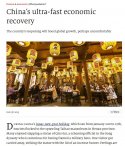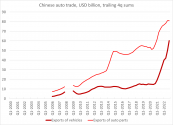Indeed, true GDP is measured via output of Luosifen packsAre you saying USD is a fake measure of GDP? OK.
LOL.
You are using an out of date browser. It may not display this or other websites correctly.
You should upgrade or use an alternative browser.
You should upgrade or use an alternative browser.
Chinese Economics Thread
- Thread starter Norfolk
- Start date
I love 酸笋 but I absolutely hate the smell of 螺蛳粉Indeed, true GDP is measured via output of Luosifen packs
There’s a reason why the Atlanticist west has behaved so childishly with respect to chinas development, specifically it’s engine of the BRI.
supercat
Colonel
Understandably, US fund managers are less enthusiastic.
Optimism on Chinese stocks soars to five-year highs
- Active foreign fund managers are buying mainland China and Hong Kong stocks at a pace not seen since 2018, according to EPFR. The managers are also buying U.S.-listed Chinese stocks, at a more muted pace, the firm said.
- But U.S.-based active money managers are still sitting on the sidelines, and any sustained rally needs them — and local Chinese investors — to buy in, according to Bernstein.
Why? If they invest, they're going to be some of the biggest winners. Believe me, one of the biggest fears of any major US investor are bans on US investment in Chinese firms. Imagine missing out on all that growth and gains just because your government says so. It'd be infuriating, especially if you're an analyst or trader who heavily studied Chinese markets.Understandably, US fund managers are less enthusiastic.
Definitely. I remember in 2020 still seeing articles like "why can't China make successful cars?"View attachment 106726
The emergence of Chinese auto exports is not a new story, but the explosive growth of vehicles for export most definitely is.
How the tables have turned in just two years. I think it comes down to the Chinese strategy of investing in emerging, disruptive trends, rather than trying to take on the existing players in an already saturated industry. Thus, going after electric vehicles, rather than gas vehicles. 5G, rather than 3G. Electronic commerce, rather than retail.
Basically, industries where starting from scratch is an advantage, rather than a burden. This has been key to China's market success. When the field is green, the guy who's got no legacy interests holding him down has the initiative.
It is critical for China to continue retain that *market access* of its successful exports for this strategy to continue. Thus far Europe has played ball - it is up in the air whether it will continue to do so going forward, at least to the degree it has in the past.Definitely. I remember in 2020 still seeing articles like "why can't China make successful cars?"
How the tables have turned in just two years. I think it comes down to the Chinese strategy of investing in emerging, disruptive trends, rather than trying to take on the existing players in an already saturated industry. Thus, going after electric vehicles, rather than gas vehicles. 5G, rather than 3G. Electronic commerce, rather than retail.
Basically, industries where starting from scratch is an advantage, rather than a burden. This has been key to China's market success. When the field is green, the guy who's got no legacy interests holding him down has the initiative.
As we are seeing in various industries (to varying degrees), the US has started limiting such market access either via tariffs or non-tariff trade barriers (FDA dragging their feet with Chinese drug approvals for example, or what they insinuate against Huawei). This is precisely why Chinese companies are setting up factories in Mexico (I've met them and this is what they say) - to retain market access.
Sit back and think about the implication - it means some of the jobs of these Chinese companies will not be Chinese workers but Mexican (and in some cases, Vietnamese/Indonesian) - while Chinese GNP will be higher, its GDP will be somewhat impacted going forward.
By the way, it is quite abundantly clear that if the US/Europe does not give Chinese companies market access, they themselves will be shooting themselves in the foot (higher inflation, lower quality product at any given price) - but never underestimate the political expedience of economic sabotage.
Remember that during the Smoot-Hawley tariffs, hundreds of economists co-signed an open memo suggesting that the tariffs were bad - this was an era where economists couldn't agree between Keysian/Classical schools of thought - yet they agreed on that. But guess what - those tariffs were enacted anyways.
We should be under no illusion in understanding that the next decade will be tougher than the last - for anyone anywhere in the world.
Last edited:


